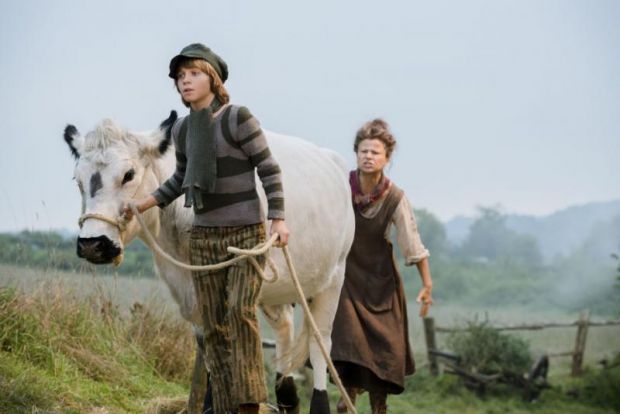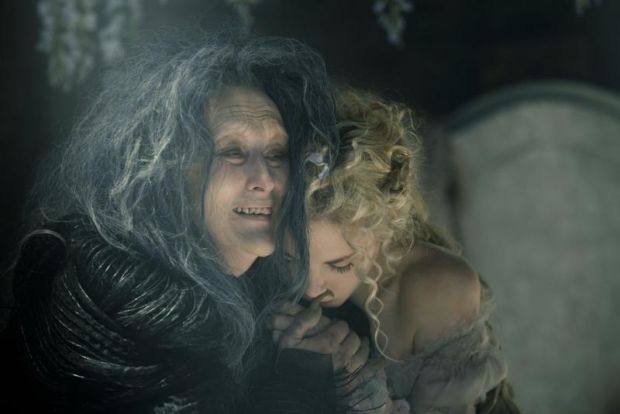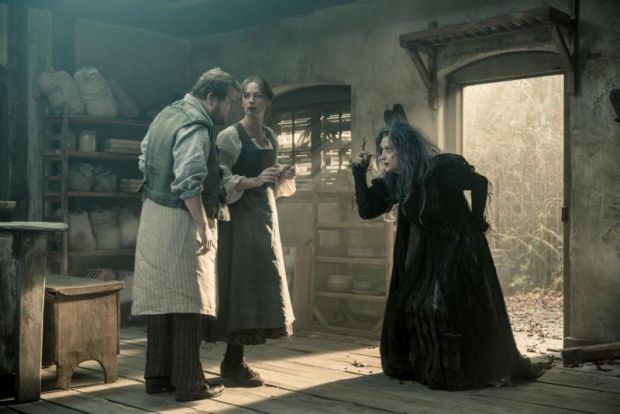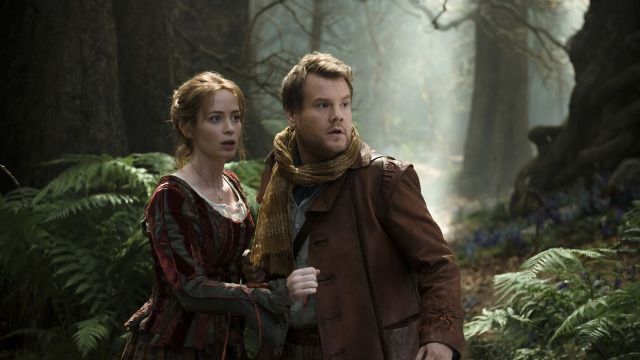Into The Woods
Lovers of Sondheim need not fear the arrival of Disney’s Into The Woods, although there are always going to be those lovers of Musical Theatre who believe it is sacrilege to tamper with something so iconic. There is already a brilliant stage production available on DVD, but a large-scale film production requires a different approach to the material, and a different ethos when judging the result. That requires discarding opinions formed about the stage production, letting go of certain expectations, and opening oneself up to the more visual storytelling that film provides, where a close-up of an expression can negate the need for dialogue or even a song.
True, there are some losses, but the gains far outweigh them and Director Rob Marshall has shown restraint and respect for the much loved stage musical which starts out by melding various fairy tales together, and ends as a morality tale.

The story has always been somewhat convoluted, especially in the second act, and it now has a cleaner line and is easier to follow. The Baker and his wife still need to go into the woods to retrieve items for the witch so that she will lift the curse which is keeping them childless. Everything that follows has a clear relationship to that central premise because of the filmic focus; and there’s less exposition and the subsequent sub-plots and secondary stories take their places simply through how much weight the camera gives them.

Yes, there are fewer deaths (and they happen offscreen) and far less sexual connotation, but there is enough darkness to satisfy most of us, and a much clearer arc and understanding of the characters, all of whom now seem real and with purpose rather than mere fairy tale characters there to serve the stunning music….which, by the way, has never sounded better. Jonathan Tunick’s original arrangements are now augmented to full symphonic scale and the orchestra is quite breathtaking. Some will mourn the loss of various songs but for the most part they are really not missed. Again, it’s imperative to approach the film as a whole new entity. The song ‘Ever After’ (along with several others) is cut - though we hear an orchestral version - and since there’s no intermission, the transition from ‘Light’ to ‘Dark’ is not as clean, and seems abrupt.

The gains are enormous for lovers of Art Direction and props. The film looks stunning. No stage set could ever convey the woods in the way the film does, though there’s little attempt at realism. But the style and the colour palette are just gorgeous. Being able to follow a panning shot from the Baker’s house through to the Witch’s garden gives a marvellous juxtaposition of style and firmly locks in our perception of time and space. Dion Beebe’s exquisite cinematography is quite breath-taking and always serves the story. And it needs to, because the role of the narrator is gone, no longer necessary to fill in blanks in the story, since the visuals need no exposition. Instead there is a voice over narration which is used to convey subtext and sometimes back-story, but never to explain what we can clearly see with our own eyes.

And then there are performances to drool over, and the casting is perhaps Marshall’s greatest achievement. Meryl Streep is even better than we hoped she would beas the Witch. In fact it’s hard to imagine anyone else in the role once you have seen her. The camera loves her and picks up every nuance, every tiny expression in her eyes. She makes the witch totally sympathetic and yet still with a real edge of malice; selfish and needy as a mother to Rapunzel. Her makeup, with broken rotted teeth and wrinkled skin, is superb, doubling the effect of the transformation which makes her so beautiful she would give any woman 30 years younger a run for their money. Her voice is in brilliant shape and if you don’t get goosebumps from her singing “The Last Midnight” (despite there being no “First Midnight” or “Second Midnight”) then something is drastically wrong. She also nails “Children Will Listen”, almost reducing us to tears. She has already been nominated for a Golden Globe Award and seems a certainty for an Oscar nomination as well.

Emily Blunt is superb as the Baker’s Wife, adding real depth to the anguish over her affair with Prince. She is totally credible in every scene. James Corden, though barely a singer, is delightful and endearing as The Baker. Johnny Depp’s much publicised appearance as The Wolf is rather anti-climactic (though the man has harisma by the bucket load) and he takes a recitative approach to the singing, rather than full voice, Tracey Ullman is perfect casting as Jack’s Mother and (though we don’t see the giant) veteran actress Frances de la Tour is just marvellous in her cameo as the grief-stricken Mrs Giant.

Marshall doesn’t take the opportunity to go to the Giant’s castle at the top of the Beanstalk, though certainly it must have been considered at some time, perhaps he felt it would have pulled focus from the Woods too much, though we do see inside other buildings on the periphery.

All that said, it WORKS on its own terms and there are moments to savour forever. Chris Pine and Billy Magnussen are superb as the two princes and the campery in ‘Agony’ is totally hysterical…negating the need for a reprise; Christine Baranski is delicious as the wicked stepmother and Anna Kendrick (though not my cup of tea) is solid and convincing as Cinderella. The nuances and subtext are subtle and the whole film has a dreamlike quality that creates an atmosphere far removed from Marshall’s often-frenetic style in past fims.

Best of all, it is magical entertainment. Hopefully thousands will see it who are not normally musical theatre goers and they won’t be disadvantaged in any way by not knowing the show. The film stands firmly as a separate entity. It’s still a Fairy Story for Grown ups…not young children, and it will no doubt create many new Sondheim fans…and that’s something we all want.
Coral Drouyn
Subscribe to our E-Newsletter, buy our latest print edition or find a Performing Arts book at Book Nook.

